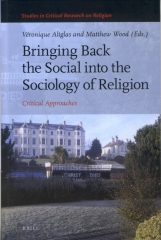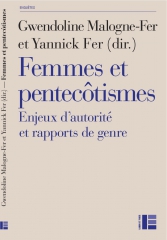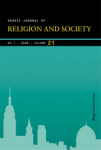 J'ai participé au livre collectif paru récemment sous la direction de Véronique Altglas et Matthew Wood, Bringing Back the Social into the Sociology of Religion (Leiden, Brill). Voici une présentation générale de ce livre et un résumé de ma contribution, qui représente une synthèse de mes réflexions sur la compréhension sociologique des émotions en contexte religieux. La table des matières est consultable en cliquant ici.
J'ai participé au livre collectif paru récemment sous la direction de Véronique Altglas et Matthew Wood, Bringing Back the Social into the Sociology of Religion (Leiden, Brill). Voici une présentation générale de ce livre et un résumé de ma contribution, qui représente une synthèse de mes réflexions sur la compréhension sociologique des émotions en contexte religieux. La table des matières est consultable en cliquant ici.
Présentation. The contributors to Bringing Back the Social into the Sociology of Religion explore how ‘bringing the social back into the sociology of religion’ makes possible a more adequate sociological understanding of such topics as power, emotions, the self, or ethnic relations in religious life. In particular, they do so by engaging with social theories and addressing issues of epistemology and scientific reflexivity. The chapters of this book cover a range of different religious traditions and regions of the world such as Sufism in Pakistan; the Kabbalah Centre in Europe, Brazil and Israel; African Christian missions in Europe; and Evangelical Christianity in France and Oceania. They are based upon original empirical research, making use of a range of methods – quantitative, ethnographic and documentary.
Résumé. The concept of emotion appears to work in the sociology of religion as a pre-notion linked with processes of (dis)qualification and distinction. These processes determine the scientific (and social) classification of “emotional” religious actors. They also shed light on the role that sociologists themselves play as “ranking agents ranked by their own ranking” (Bourdieu, 1979: back cover). Through the distinctions they make, they reveal the position they occupy with- in the scientific field and the relations they have with the religious field.
I open the chapter by asking why the French sociology of religion has mostly ignored the affective turn and the theoretical challenges it raises, seeming to prefer the established – we could say canonical – interpretations of classical authors over empirical research. These canonical interpretations closely link the issue of religious emotions with a set of pivotal concepts of the disciplinary doxa, such as legitimacy, institution, charisma, or modernity. The dominant understanding of religious emotions is not simply a blind spot in sociological analysis; rather, it constitutes the cornerstone of an intellectual construction which, in the eyes of many sociologists in this field, “engage everything which defines their own idea of themselves,” to quote the epigraph of this chapter.
Then referring to the specific case of Pentecostalism – usually described as an “emotional religion” – I go on to consider how these canonical interpretations go hand-in-hand with strategies of categorisation and (dis)qualification. As I show, these strategies are intertwined with interests in the academic or religious field and with social relationships of domination. They highlight the social distance between the academic position (and the intellectual figure, classically associated with reason) and the religious “emotional” field. They also point to classification struggles between religious actors themselves.
Finally, I suggest how to disentangle the sociology of religious emotions from the influence of beliefs, distinction effects, and academic doxa and connect this field of research to wider social dynamics, such as the evolution of the relationships between individual and institution, the contemporary ideology of the “society of communication” (Neveu, 2001), and the norms of self-control in relation to the body.
 Sous la direction de Gwendoline Malogne-Fer et Yannick Fer
Sous la direction de Gwendoline Malogne-Fer et Yannick Fer L'année 2010 se termine sur trois publications.
L'année 2010 se termine sur trois publications.
